-
How You Can Get the Smile You Want with Veneers
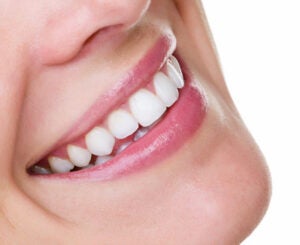
Your smile is one of the first things people notice about you. If you have flawed teeth, you may be all too aware of this, smiling with closed lips or covering your mouth with your hand to hide them. What if you could smile confidently? With veneers, you can!
A veneer is a thin, custom-made shell that bonds to the front of your tooth. It’s made of tooth-colored material, such as porcelain, which is carefully matched to your existing teeth for a completely natural finish. Here’s how you can get the smile you want with veneers.
Straighten Crooked Teeth
Veneers aren’t meant to replace orthodontic treatment, but if you have crooked teeth, this could be an option. An oral exam and digital X-rays are the best way to determine if braces or veneers will improve your smile most effectively over the long term.
Fill in the Gaps
You want your teeth to sit snugly side-by-side. If there are gaps between some of them, your mouth may appear neglected and be more vulnerable to cavities and gum disease. You could bring your teeth together manually with braces or a retainer, but if the gaps are caused by small teeth rather than poor alignment, veneers could be the superior solution.
Correct Discoloration
Have you tried to whiten your discolored teeth without success? While professional in-office teeth whitening can remove surface stains, it can’t touch deep stains or discoloration caused by traumatic tooth injury. Fortunately, veneers can! As long as your teeth are healthy, you can cover them with custom-made veneers in a sparkling shade of white.
Hide Imperfections
Is one of your front teeth longer than the other? Are you self-conscious about a snaggletooth? Maybe one or two of your teeth are smaller than the rest. Whether uneven, worn, or oddly shaped, veneers can almost certainly hide your imperfect teeth.
Smooth out Chipped Teeth
Tooth enamel is the hardest material in the body, but it’s not impervious to chipping. Veneers restore your appearance by smoothing out chips, making them invisible. Anyone who sees you smile after having this restoration work performed will only notice beautiful, healthy-looking teeth.
The Veneer Procedure
When you set an appointment at Park 56 Dental to discuss your cosmetic dentistry questions, we’ll show you what veneers can do. If you decide to move forward, we’ll begin the restoration process by taking impressions of your teeth. Custom veneers are made based on these impressions for a precise fit.
On the day of your fitting, the dentist will prepare your teeth by shaving them down slightly so the veneers align with your natural teeth. Next, the veneers are attached using dental cement. A curing laser speeds up the drying process and ensures a permanent bond. After a final cleaning and polishing, you’ll be left with the beautiful smile you’ve always wanted!
To learn more about hiding flawed teeth with veneers, or to schedule a consultation with our NYC dentist, please contact Park 56 Dental at (212) 826-2322.
-
How Poor Dental Hygiene Affects Your Overall Health
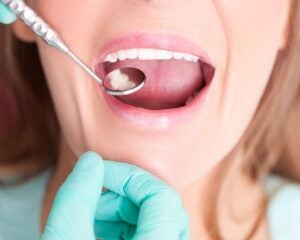
You probably know that if you don’t take good care of your teeth and gums, you increase your risk for cavities, gum disease, and bad breath. But are you aware that oral health can affect the rest of your body? Connections have been discovered between decreasing oral health and many seemingly unrelated diseases and conditions. Learn more about this connection here, as well as how to maintain a healthy mouth and body.
Heart Disease
When your gums are damaged and infected because of gum disease, oral bacteria can enter your bloodstream directly through this soft tissue. This allows bacteria to travel to your heart, where clots can form as a result. A condition called endocarditis, or inflammation of the inner lining of the heart, may also develop.
Chronic gum inflammation also emits chemicals that can cause atherosclerosis, or the clogging and hardening of artery walls. This health condition blocks blood flow, increasing the risk of heart attack and stroke.
Dementia
The harmful bacteria that grow when you have gum disease don’t only travel to your heart—they also enter the brain, where they kill brain cells and lead to memory loss. This may increase the chance of developing dementia or Alzheimer’s disease.
Respiratory Infections
It’s possible to inhale oral bacteria that form because of gum disease. Once in the lungs, the bacteria can cause infections, pneumonia, acute bronchitis, and even chronic obstructive pulmonary disease (COPD).
Diabetes
Gum disease and diabetes are a dangerous combination. If you are diabetic, you are more susceptible to infections, including gum disease. Then, if you have gum disease, this heightens your risk for high blood sugar, which can lead to diabetes or worsen your existing symptoms. And if you have both conditions at once, you have a higher chance of developing kidney disease.
Rheumatoid Arthritis
Oral bacteria from gingivitis can increase inflammation throughout the body. This makes people with gum disease more likely to develop rheumatoid arthritis, a painful and debilitating inflammatory condition.
Pregnancy Complications
Hormonal changes during pregnancy increase the risk of oral health problems. Then, developing gingivitis or periodontitis can lead to premature birth, low birth weight, and other health issues for mother and baby.
Maintain Good Oral Hygiene to Protect Your Overall Health
The message is clear: good oral hygiene can do more than preserve your teeth and gums—it can keep your whole body healthy. To discourage the problems that often accompany gum disease, remember to follow these tips:
- Brush your teeth morning and night with fluoride toothpaste.
- Floss daily.
- Chew sugarless gum after meals.
- Avoid cigarettes and chewing tobacco.
- Eat a well-balanced diet and limit your sugar intake.
- Seek fluoride treatment from your dentist.
- Schedule teeth cleanings and dental checkups every six months.
If it’s been a while since your last dentist visit, set an appointment at Park 56 Dental by calling us at (212) 826-2322. We’ll check the status of your teeth and gums and recommend a treatment plan if necessary.
-
How Restoring Your Smile Can Help with Your Mental Health

Good oral health affects your overall wellness in many ways. Straight teeth ensure a comfortable bite and help you chew thoroughly. Then, healthy gums can help stave off other complications, including stroke, diabetes, and heart disease. But have you ever considered how restoring your smile can improve your mental health? The psychological impacts of a beautiful smile can’t be ignored.
Greater Self-Confidence
If you feel self-conscious about crooked, chipped, or stained teeth, you may often cover your mouth with your hand or maintain a tight-lipped smile. Correcting any problems with your teeth and gums generates a wave of self-confidence. This encourages you to smile, laugh, and communicate without underlying anxiety about people looking at your teeth.
Decreased Risk of Depression
Researchers from Deakin University found a connection between depression and oral health. In short, if you’re experiencing problems with your teeth and gums, your chances of feeling depressed increase. As an inflammatory disorder, depression can be triggered by inflammation in the gums (or elsewhere in the body). This means, if you’re feeling down, you should take a closer look at your oral care routine. Enhancing your dental hygiene could improve your mental health.
Boosted Mood & Physical Health
Scientists and therapists agree—the simple act of smiling has undeniable emotional advantages. It has been demonstrated that flashing a smile releases dopamine, endorphins, and serotonin into the brain, which helps fight off stress and promote feelings of joy. These feel-good neurotransmitters even help lower your heart rate and blood pressure for improved physical health as well.
Better Appearance
A 2011 study found that both men and women are perceived as more attractive when they smile and make eye contact. You are more likely to interact in a friendly manner with those around you if you are confident with the appearance of your smile.
Longer Lifespan
Emotions affect your personality and life outcome by influencing the way you think, behave, and interact with others. People with more positive emotions are happier, have more stable relationships, and are more likely to live longer than people with overwhelmingly negative emotions. It stands to reason that happier people smile more and, as already stated, smiling makes you feel happier. A Wayne State University study from 2009 brings the point home by suggesting that people who smile more intensely tend to have longer lifespans.
Enhanced Ability to Spread Joy
If you have straight, white teeth that you want to show off to the world, you’ll be encouraged to smile more often. As they say, “Smile and the world smiles back.” This phrase comes from the notion that smiling is contagious. When you walk around with a smile on your face, it lifts not only your own mood but also the moods of those around you. This isn’t just common sense—it’s backed up by current research.
Ready to improve your mental health? Start by restoring your smile at Park 56 Dental! Call our NYC dentist at (212) 826-2322 or schedule your appointment online today.
-
How to Reduce Teeth Whitening Pain
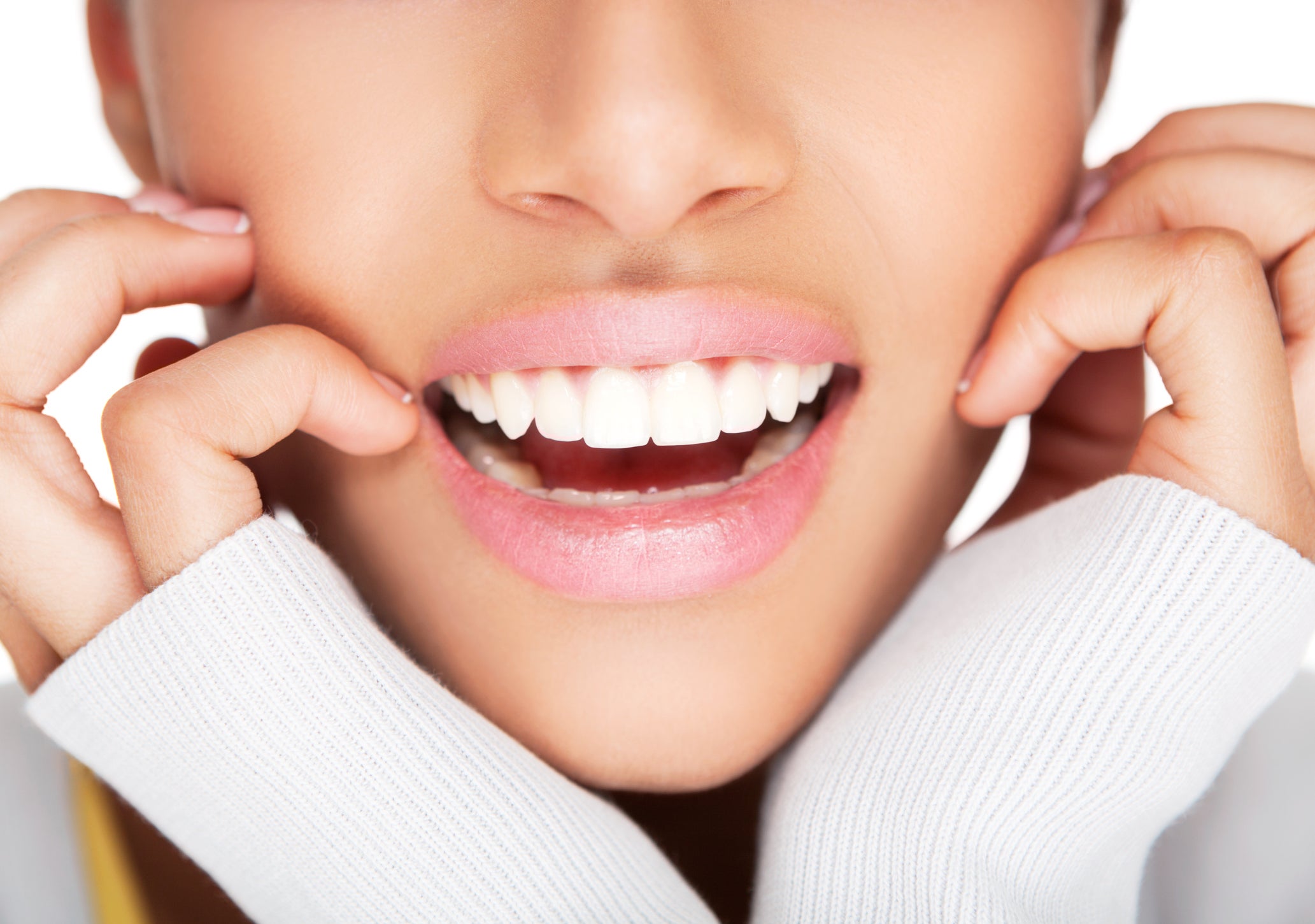
Whitening your teeth is a fast, easy way to improve the appearance of your smile. One common side effect is temporary pain and sensitivity to hot and cold drinks. We’re here to help you understand what causes teeth whitening pain and how you can prevent it.
Is Tooth Whitening Safe?
Zoom! whitening is a professional treatment that brightens your smile by an average of eight shades in a single, one-hour visit. While it’s championed as a simple, safe, and pain-free process, some patients still experience temporary hypersensitivity following treatment. If you’re concerned about this, speak with your dentist before having Zoom! whitening performed.
Why Do Teeth Sometimes Hurt After Whitening?
You are most likely to experience discomfort after whitening if you already have sensitive teeth. This is often caused by thin enamel or exposed roots. Both issues leave the underlying layer, known as dentin, vulnerable to the bleaching agent found in teeth whitening products. If the nerve endings here are irritated by the whitening process, you could be left with hypersensitivity for the next 24 to 48 hours.
How to Prevent Teeth Whitening Pain Before Treatment
- Switch to desensitizing toothpaste: One to two weeks prior to your treatment, brush with toothpaste containing 5 percent potassium nitrate to build up a resistance to sensitivity. This substance is known to reduce tooth pain, so it’s a common ingredient in desensitizing toothpaste. Brush before your treatment to clean and prepare the surface of your teeth for whitening.
- Take medicine: Immediately before your whitening appointment, take over-the-counter anti-inflammatory drugs as a proactive measure against tooth sensitivity.
- Apply ACP gel: Request relief ACP desensitizing gel from your dentist. If you have whitening trays at home, dispense a pea-sized amount into each impression and wear the tray for 30 minutes before heading to your professional Zoom! whitening treatment. If you don’t have whitening trays, apply the gel using a toothbrush.
How to Prevent Teeth Whitening Pain After Treatment
- Wait to brush: If you brush your teeth too soon after whitening, you will further expose the dentin, increasing sensitivity. Therefore, you should wait to brush for a couple of hours. When you do, brush extra gently. Use a soft-bristled toothbrush and lukewarm water to take some of the sting out of your sensitive teeth.
- Avoid hot and cold drinks: Hot coffee and ice-cold water could cause pain, so stick with room-temperature beverages for the next 24 to 48 hours. You may also find it helpful to drink through a straw so liquids bypass your teeth for the most part.
- Keep taking medicine and using ACP gel: If you continue to experience sensitivity despite your other efforts, take more anti-inflammatory drugs and reapply the ACP gel after each meal.
Park 56 Dental is proud to offer Zoom! whitening, the fast, easy way to whiten your smile. If you’re interested in scheduling treatment, or you have more questions about tooth sensitivity, please contact us online or by phone at (212) 826-2322.
-
15 Things That Cause Bad Breath

Do you suffer from bad breath, also known as halitosis? In a majority of cases, the odor stems from bacteria in your mouth. Everyone knows that eating onions and garlic can make your breath stink, but these are far from the only culprits. Learn what other things cause bad breath so you can avoid them.
- Citrus fruit: Odor-causing bacteria love acidic environments, so eating lots of citrus fruit invites bad breath to stick around.
- Pasta sauce: Tomatoes are acidic as well, meaning red pasta sauce can contribute to bad breath.
- High-protein diets: The body produces ammonia as a byproduct of breaking down protein. When the odor escapes from your mouth, it causes bad breath.
- High-sugar diets: Because of how sugar interacts with the bacteria in your mouth, eating too many sweets could result in sour breath.
- Peanut butter: Its sticky consistency makes peanut butter difficult for saliva to wash away. As it lingers, bacteria feed, making your breath stink for hours at a time.
- Canned fish: Fishy compounds tend to linger in the mouth, giving off an unsavory smell until you drink water, chew gum, or brush your teeth.
- Cheese: Most dairy products, including cheese, contain amino acids that react with bacteria in your mouth to produce excess hydrogen sulfide. The result is a mouth that smells like rotten eggs.
- Horseradish: Isothiocyanate is a sulfur-containing compound found in all cruciferous vegetables, including horseradish. Mint is the best way to combat the effects of this compound.
- Coffee: Your favorite morning beverage has a drying effect on the mouth, reducing saliva flow and allowing odor-causing bacteria to thrive.
- Alcohol: Excessive alcohol consumption causes dehydration, which can reduce saliva production. This creates a dry environment for foul-smelling bacteria to flourish.
- Tobacco: Smoking or chewing tobacco causes an unpleasant odor in the mouth. Smokers are also more likely to develop gum disease, another source of bad breath.
- Medications: Some prescriptions cause dry mouth, a known cause of halitosis. Other drugs break down in your body, releasing foul-smelling chemicals that can be carried on your breath.
- Infections: Gum disease, tooth decay, mouth sores, or surgical wounds may lead to infections that cause bad breath and an unpleasant taste in your mouth.
- Digestive issues: Chronic digestive distress, acid reflux, and bowel disorders can produce gases that cause halitosis. An inability to digest certain enzymes could also lead to bad breath.
- Poor dental hygiene: The best way to combat almost all sources of bad breath is to brush, floss, and rinse with mouthwash. By maintaining good oral health, you can combat halitosis before it starts.
If your bad breath just won’t go away, you may need help from a dentist to uncover the underlying cause. Please contact Park 56 Dental at (212) 826-2322 to work with one of the top dentists in New York. By providing a thorough dental cleaning, we can help you get rid of bad breath for good!
-
Everything You Need to Know about Mouthguards
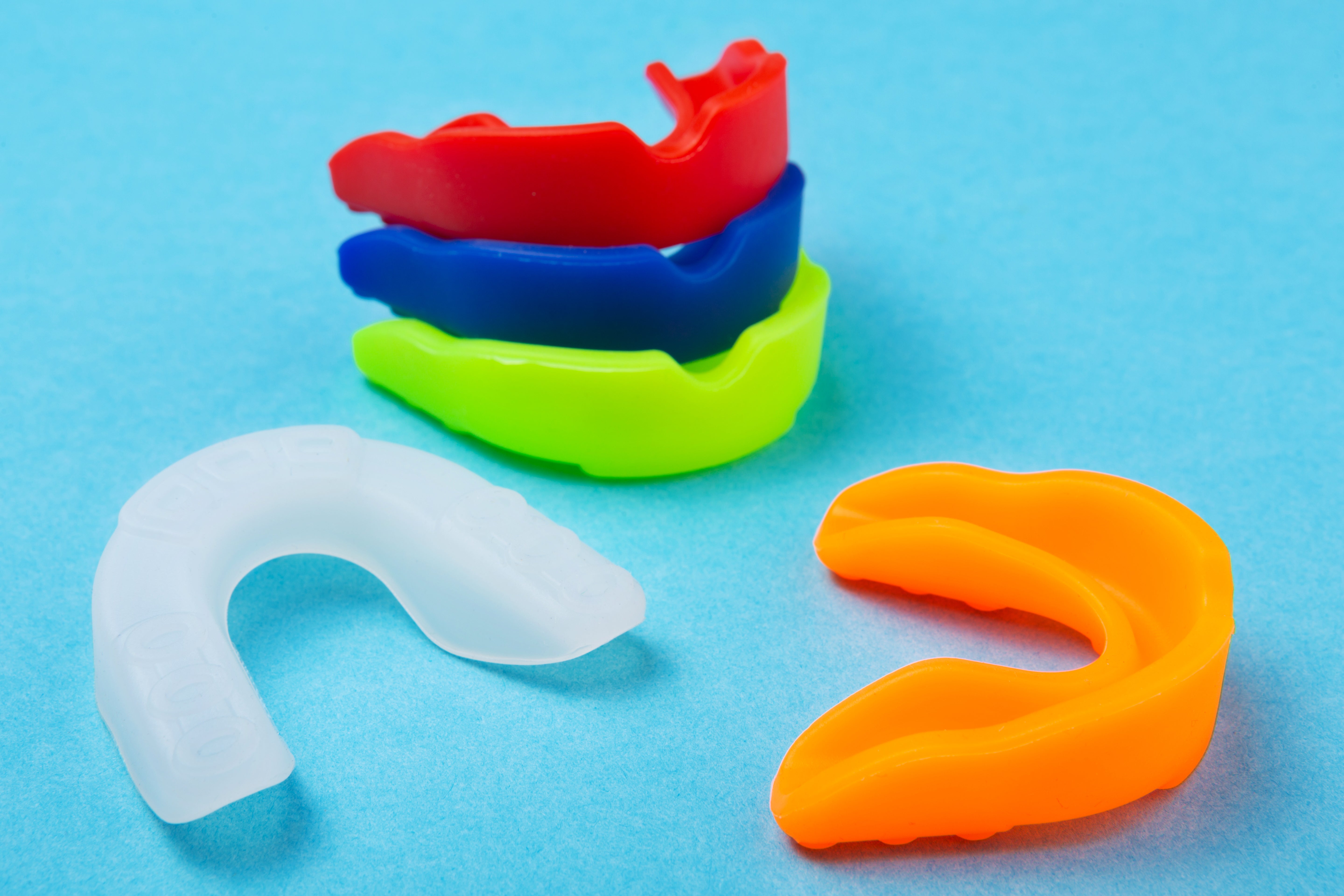
Playing sports can be risky. You could twist your ankle, sprain a wrist, bite your lip, or get a tooth knocked out. While you can’t eliminate all risks when playing sports, you can protect your teeth and lips by wearing a custom mouthguard. Learn more about your options here to help you decide what’s best for you.
What is a Mouthguard?
A mouthguard is an oral appliance designed to protect your teeth, lips, and cheeks from injury while playing sports. Similarly, night guards help prevent damage from nighttime tooth-grinding, also known as bruxism. The American Dental Association (ADA) has specific guidelines for what makes the ideal mouthguard. The appliance should:
- Sit comfortably and securely in the wearer’s mouth
- Cover all the teeth on one or both arches
- Have a resilient design and construction with materials approved by the Food and Drug Administration (FDA)
- Be easy to clean
- Maintain high-impact energy absorption and force transmittance if the wearer is playing sports
Types of Mouthguards
Not all mouthguards are created equal. There are three main types to choose from:
- Stock mouthguards come in various sizes, with most options fitting over the top teeth. This option can be bulky and uncomfortable.
- Boil-and-bite mouthguards are inexpensive options available in most drugstores. You place the mouthguard in boiling water to soften it, and then mold it to your teeth for a better fit than most stock mouthguards can provide.
- Custom-made mouthguards are the best, longest-lasting options available. A dentist makes a mouthpiece just for you, with the perfect fit and maximum comfort.
Do I Need a Mouthguard?
Mouthguards serve different purposes. You should consider getting one if any of the following applies to you:
- You play sports. The ADA recommends mouthguards to protect against chipped teeth, knocked-out teeth, and soft tissue injuries while playing full-contact sports such as hockey, football, lacrosse, and wrestling. Athletes who play non-contact sports can also benefit from wearing a mouthguard.
- You grind your teeth at night. You’ll need to wear a different kind of mouthguard, known as a night guard, to prevent tooth grinding while you sleep.
- You have jaw joint disorder. Temporomandibular Joint Disorder (TMJD) is a condition that causes the muscles around your jaw to become inflamed, leading to tooth clenching and grinding. A specially made mouthguard can help with this.
At Park 56 Dental, we help our patients protect their teeth with Under Armour® Performance Mouthwear™. These advanced mouthguards are custom-made to fit your bite for superior protection and comfort. Under Armour mouthpieces are made from the highest quality materials for safety and durability. Athletes who play sports in college, professional leagues, and the Olympics put their trust in Under Armour, and so can you.
If you’re an athlete looking for the best teeth and mouth protection available, please call Park 56 Dental at (212) 826-2322 or schedule an appointment online today. We offer quick, custom mouthguard fittings that take as little as 20 minutes.
-
Invisalign During COVID Times
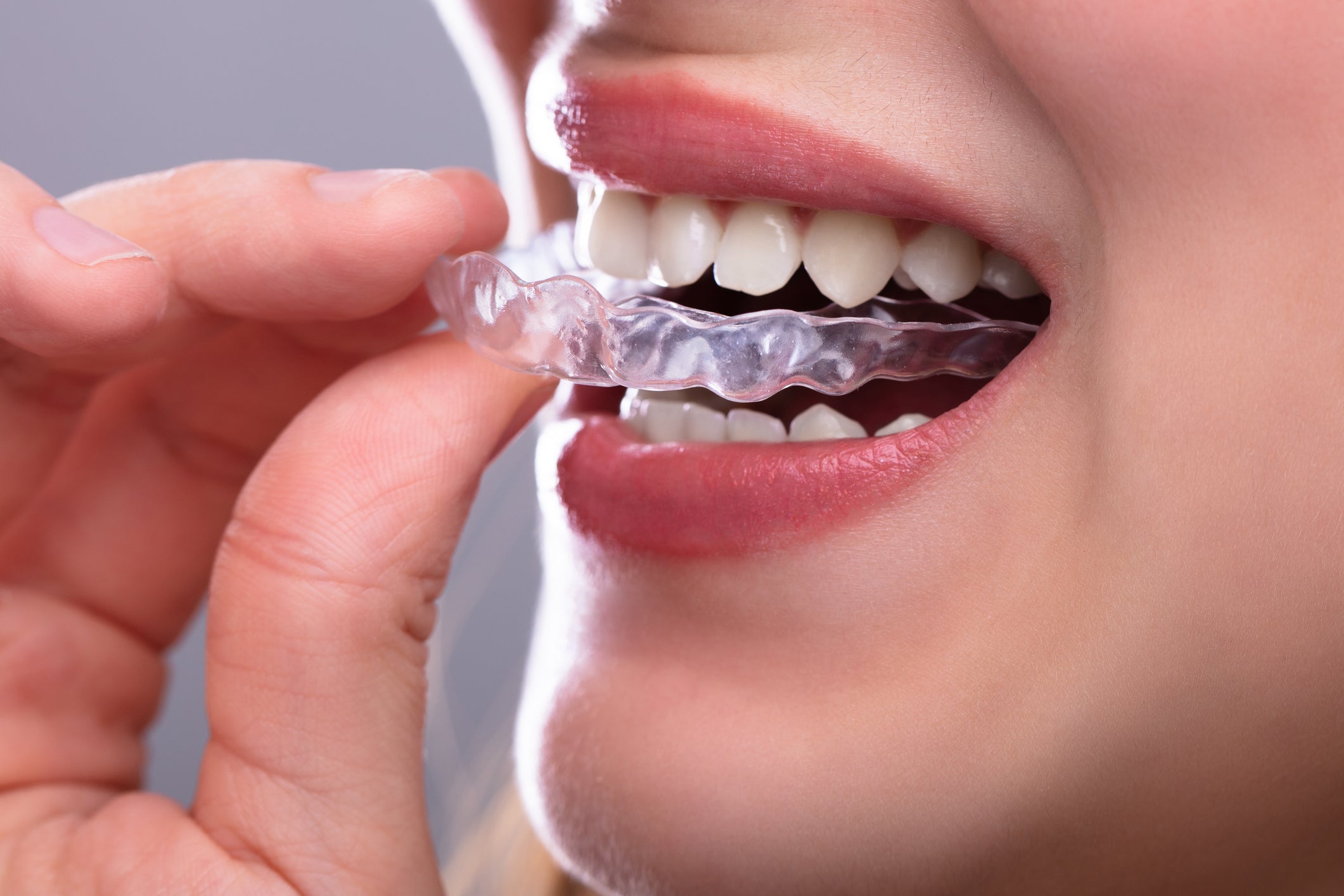
Are you working toward a straighter, more beautiful smile with Invisalign? Perhaps you’re interested in pursuing this wire-free tooth-straightening method, but you’re not sure where to start. After all, the COVID-19 pandemic has altered dental practices and left many patients wondering what procedures are even available at this time.
Rest assured that Park 56 Dental in NYC is open for business! We’ve made a few changes to ensure your safety and comfort while visiting our office. For instance, we provide a pre-visit health screening and contactless temperature check for all visitors and team members. We also offer masks and hand sanitizer upon request, and we maintain social distancing with staggered check-ins and zero wait times.
Whether you’re interested in starting Invisalign or continuing your existing treatment during COVID times, we can meet your needs. Here’s what you need to know.
Beginning Invisalign Treatment
With the safety protocols in place at our New York City dentist office, now is a good time to begin Invisalign treatment. Visit our office for digital X-rays and a scan of your mouth. Thanks to advanced computer technology and your dentist’s expertise, you’ll receive a roadmap of your path to a straighter smile before leaving the office.
Once the plan is finalized, custom aligners are made to fit your existing smile, along with 18 to 30 additional sets of aligners designed to gradually shift your teeth to the desired position over the next nine to 15 months or so. Pick up your aligners from us, and start wearing them to begin seeing a difference within a matter of weeks.
Continuing Your Invisalign Treatment
If you already have Invisalign aligners from before the pandemic, continue to wear them as usual. You should experience no delays in your treatment if you follow these tips:
- Wear your aligners for at least 20 to 22 hours per day.
- If you lose an aligner, move on to the next one.
- If you have any issues with loose or poorly fitting aligners, give us a call.
With today’s heightened focus on hygiene and avoiding illness, you should be extra diligent about keeping your Invisalign aligners clean during COVID times. Here’s how:
- Wash your hands before putting in or taking out your Invisalign.
- Rinse your aligners whenever you remove them, and clean them thoroughly morning and night.
- Never eat or drink anything except water when wearing your aligners.
- Store your aligners in a protective case anytime you take them out.
- Brush or floss before putting your Invisalign back in.
The skilled dentists at Park 56 Dental are ready to help transform your smile with Invisalign. If you’re still working from home during these COVID times, you’re sure to make an impression when you return to work a few months from now with straight, gorgeous teeth!
Want to learn more about the Invisalign process? Ready to schedule a consultation at our New York City dentist office? Call us at (212) 826-2322 or contact us online today.
-
Should You Visit the Dentist During the Coronavirus Pandemic?
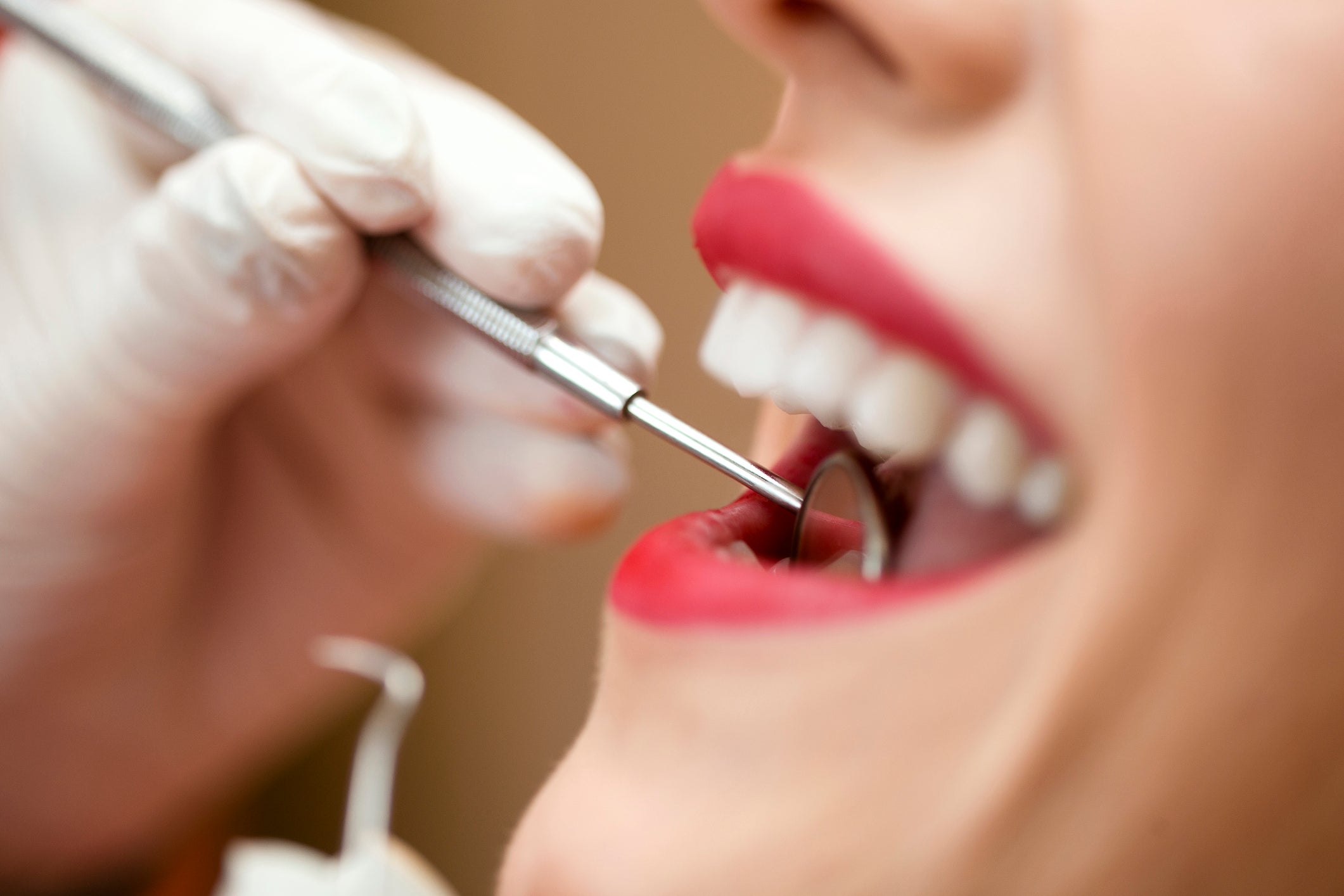
For several weeks in early 2020, dentists in New York City and elsewhere across the globe were required to stop providing non-urgent care in response to the novel coronavirus pandemic. As we resume our “new normal,” many patients are asking—is it still too early to visit the dentist?
Rest assured that the American Dental Association (ADA) and the Centers for Disease Control and Prevention (CDC) are now allowing patients to return to the dentist for routine cleanings, cosmetic dentistry, and other elective services—with a few changes in place. Here’s what you should know before visiting the dentist during the COVID-19 pandemic.
Is My Dentist’s Office Safe?
Germs are everywhere, but healthcare facilities, including dentist’s offices, have always been among the cleanest places you could go. Many safety guidelines have been the norm for years, including regularly washing your hands, sterilizing tools, and discarding certain gear and needles after a single use.
In light of the pandemic, many dentists, including Park 56 Dental in NYC, are doing even more. Here are some of the steps we’re taking to ensure patient safety and comfort:
- Conducting pre-visit health screenings and contactless temperature checks for all visitors and staff
- Making masks and hand sanitizer available upon request
- Staggering check-ins to minimize wait times and help maintain social distancing
- Holding virtual appointments to answer questions or conduct follow-ups
How “Essential” are Dentist Visits?
The fact that dentist offices were shut down for everything but emergency procedures could make some people think that routine teeth cleanings aren’t that important. However, the condition of your teeth and gums can greatly impact your overall health. In fact, putting off routine cleanings could compound dental problems and other health issues in the months and years to come.
The practical precautions that dentist offices are currently taking are effective at reducing the risk of coronavirus transmission while allowing you to care for your teeth and gums. Skipping your appointments any longer than necessary is simply not worth the risk to your oral health.
What to Consider Before Going to the Dentist
Social distancing is the best way to slow the spread of the coronavirus. If you have symptoms of COVID-19, you should self-isolate for 14 days. In short, cancel your dentist appointment if you’re not feeling well. You’ll be sent home if you come in with a cough, fever, or shortness of breath. You should also stay home if you think you have been around anyone who has the coronavirus, whether or not they have tested positive.
Park 56 Dental in NYC is open for business! Anything that can be done remotely, such as payments or health questionnaires, will be handled over the phone or via email. We are taking COVID-19 restrictions seriously and place your safety above all else. Please call us at (212) 826-2322 or contact us online to ask questions about our coronavirus precautions or to schedule an appointment. We look forward to hearing from you soon.
-
What is an All-on-4 Implant Procedure?
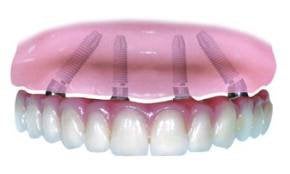
Just a decade ago, most patients were unaware that an All-on-4 implant procedure even existed. Today, many people specifically request this alternative to dentures and traditional full-arch implants. What exactly is this restoration technique, and could it be right for you?
About All-on-4 Implants
All-on-4 implants are a full-arch fixed dental implant bridge. This technology immediately replaces an entire row of teeth. As the name suggests, all the teeth are supported on just four posts that are surgically implanted into your jawbone. The result is a mouthful of healthy-looking, naturally functioning teeth.
Benefits of All-on-4 Implants
If you’re considering dental implants for a full arch of teeth, All-on-4 implants might be the better choice. The procedure is faster, more cost-effective, and requires no bone grafting for most patients. Plus, only four posts are needed compared to six or eight posts. In this way, All-on-4 implants save you time, money, and discomfort compared to traditional full-arch implants.
Then, unlike dentures, All-on-4 implants:
- Are permanent additions to your mouth that can be brushed like natural teeth
- Never have to be taken out
- Require no adhesives
- Support a strong bite force so you can eat all your favorite foods again
- Are comfortable because they are in a fixed position rather than pressing on your gums when you bite and chew
- Allow for the full taste and temperature experience of your food
- Prevent jawbone deterioration
- Help you maintain a healthy facial structure
The All-on-4 Implants Procedure
This technology uses “tilted implants” to increase strength and stability, as well as avoid damage to the sinus cavity in the upper jaw and the nerve canal in the lower jaw. The initial surgery involves installing the implants. A temporary set of teeth is placed over the implants before you leave the office. Once the healing process is complete about six months after surgery, a permanent, custom bridge is placed.
Candidates for All-on-4 Implants
You may be a good candidate for this procedure if you are missing most or all of your teeth on one or both arches. It doesn’t matter whether you already wear dentures or not. Age is also not a limiting factor—as long as you’re in good overall health, you may qualify.
Be prepared to take excellent care of your All-on-4 implants, using many of the same techniques you would expect with natural teeth. Proper care is needed to help your implants last for many years to come. Rest assured that your dental hygienist will review all instructions with you and recommend the best daily oral care plan to fit your needs.
The skilled dentists at Park 56 Dental work with the nation’s top laboratories for access to 3D, digitally guided plans. This ensures expert post placement and flawless prosthetic teeth for a smile you can be proud of! If you’re interested in learning more about the All-on-4 implant procedure, please contact us online or call our New York City dentist office at (212) 826-2322.
-
How to Prevent Gum Disease
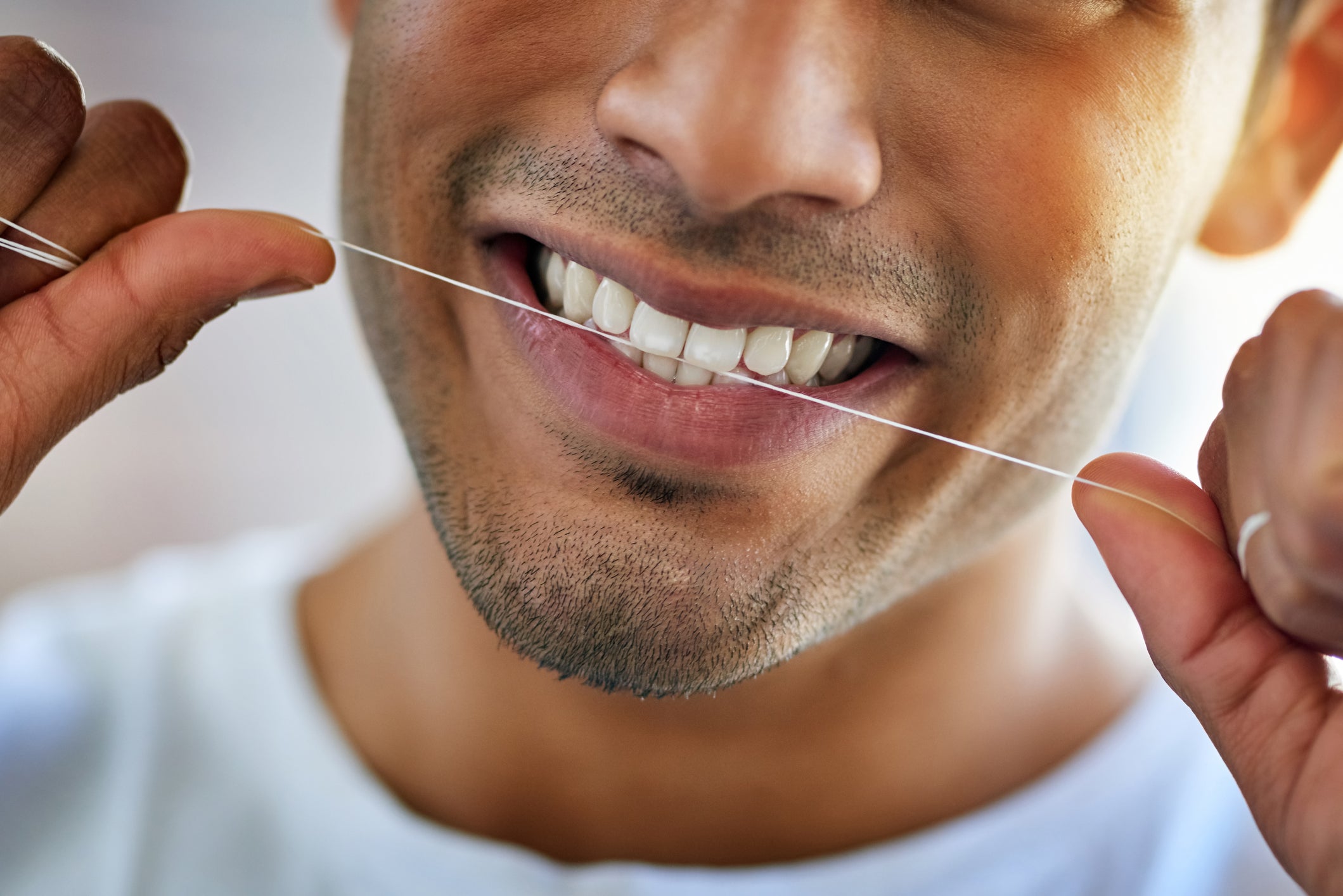
The technical name for gum disease is periodontitis or periodontal disease. This is a common infection that, according to a recent CDC report, affects nearly half of all American adults age 30 and older.
The mildest form of this disease is called gingivitis. Early symptoms include tender and swollen gums, gums that bleed when you brush your teeth, and a receding gum line. If left untreated, periodontal disease can become painful, lead to pussy discharge, and even result in tooth loss. Advanced gum disease can also increase the risk of stroke, heart attack, and other health problems.
Protect yourself from gum disease and the associated side effects by following these preventative tips.
- Brush with fluoride toothpaste. Make this a habit every morning and evening, no matter how busy or tired you are. Use toothpaste that contains fluoride and has the ADA Seal of Acceptance. Choose a soft toothbrush, and brush thoroughly but gently to avoid irritating your gums. Brush for two full minutes, and hold your toothbrush at a 45-degree angle along the gum line so it sweeps away the bacteria hiding there.
- Floss every day. When it comes to preventing gum disease, flossing is arguably more important than brushing because it stimulates the gums and removes debris from between your teeth. The American Dental Association says it doesn’t matter when you floss—do it in the morning, at night, or after lunch—just do it!
- Swish with a medicated mouthwash. All mouthwash products offer some benefits, but some promote gum health better than others. Shop for a version that reduces plaque buildup, slows tartar formation, fights gingivitis, or all three! Remember, mouthwash complements brushing and flossing—it doesn’t replace it.
- Consider and address your risks. Some people are more likely than others to get gum disease. Risk factors include advancing age, genetics, AIDS, cancer, and hormonal changes in females. While many risk factors are out of your control, others can be addressed. For instance, you can reduce your risk if you quit smoking and control associated health conditions, such as diabetes.
- Get your teeth cleaned regularly. Gum disease develops rather quickly, and the earlier you begin treatment, the better. Therefore, children and adults of all ages should schedule a dental exam and professional cleaning every six months or as recommended by their dentist. If you already have gum disease, you may need more frequent visits to maintain your gums and prevent them from getting any worse.
At Park 56 Dental, our team of qualified dental professionals can help your smile stay healthy and beautiful. We encourage you to visit us twice a year for preventative care. Then, if you notice signs of gum disease or other oral health problems, reach out to us right away. We’ll help you slow or even reverse gum disease with effective treatments such as root planing and scaling, flap surgery, and bone and tissue grafts. Contact us online or call us at (212) 826-2322 to learn more.
RECENT POSTS
categories
- Uncategorized
- Cosmetic Dentistry
- Veneers
- Healthier Teeth
- Teeth Whitening
- Dental Health
- Video
- Dental Emergencies
- Invisalign
- Dental Implants
- Root Canal
- Sedation Dentistry
- Infographic
- Dental Crowns and Bridges
- Dental Anxiety
- Gum Disease
- COVID-19
- Bad Breath
- New York Dentist
- Cut out sugar
- General Dentistry
- Oral Health
- Oral Cancer
- Dry Mouth
- Gum Health
- Toothache
- Dental Sealants
- Cavities
